2023 End of Year Showcase: Reshaping the Future
The two-hour event, free and open to the public, will feature Berkeley MEng and Fung Fellowship teams sharing the results of their team-based projects. This will be an interactive exposition. Teams will be showcasing their work either on a table top demo or poster format. This year we will be awarding Audience Appreciation Awards for both MEng and Fung Fellowship Projects! Light refreshments will be served.
Event Agenda:
- 4:30pm – Event Opens
- 4:40pm – Welcome remarks by student emcees, Thomas Guan, MEng ‘23 (ME) and Shreya Aviri FF ’24 (Conservation + Innovation)
- 4:45pm – Opening remarks by College of Engineering Dean Tsu-Jae King Liu and Fung Institute Founder Coleman Fung
- 4:55pm – Student Project Expo opens
- 6:20pm – Awards
- 6:25pm – Closing remarks by Fung Institute Faculty Director Prof. Anthony D. Joseph
- 6:30pm – Event Closes
Why attend?
- Reshape the Future. Come celebrate the different ways students across our Institute are solving challenges facing society through interdisciplinary teams and collaborating with community and industry partners.
- Networking. Attendees from across industry and campus communities will come together with Berkeley students, faculty, and alumni while learning more about the latest innovations and social impact.
- Industry-Wide Content. Attendees have the opportunity to explore trends across multiple fields and concentrations within various industries – healthcare, automotive, conservation, robotics, and more.
- Personalized Experience. Attendees can curate their event experience depending on interest. With more than 75 teams showcasing their work, there’s something for everyone!
Date: Thursday, May 4, 2023
Time: 4:30-6:30pm PT
Location: Mudd Hall (1798 Scenic Avenue)
Event Map
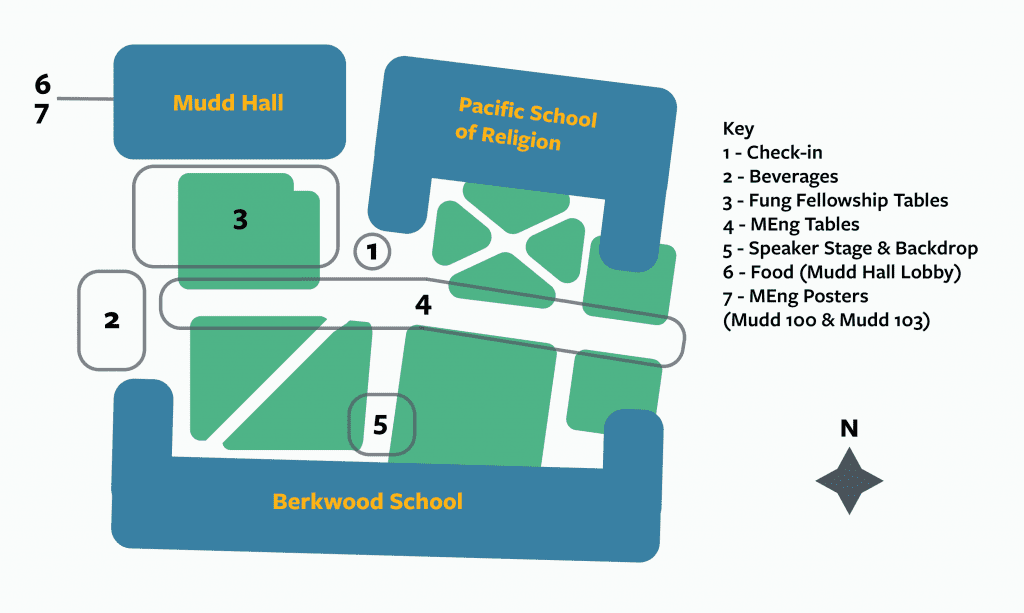
2023 Award Winners
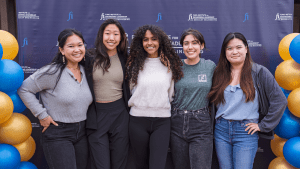
Innovation Award (Conservation)
This Innovation Award honors the project who has most effectively demonstrated: (1) the relevance of the problem they are trying to solve; (2) the originality of their proposed solution; (3) and the potential and applicability of their project’s impact.
AquaLearn
Nohea Rodriguez, Jenna Braun, Amada Tsang, Christina Pham, Anny Moreira
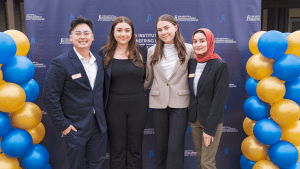
Human-Centered Design Award (Health)
The Human-Centered Design Award recognizes a project team that has demonstrated: (1) human-centered design principles to create solutions that are intuitive, accessible, and engaging for the target audience; (2) understanding of the users’ needs and experiences and integrated their feedback proactively and meaningfully.
RenalReach: A Personalized Digital Health Tool for Potential Kidney Donor Waitlist Candidates
Victor Le, Madeeha Khan, Lauren Clawson, Liv Rainville
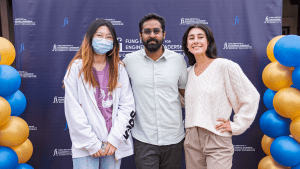
Mission Award (Honors)
This Mission Award honors the project team who has exemplified the mission of the fellowship “by advancing impactful to solve real world challenges through innovation, technology, and inclusive collaboration across communities.
Designing a Tablet Housing for Marine Megafauna Research
Laura Lira, Chang Bo; MEng collaborators: Henry Warder, Zhuoli Shu, Suhaib Khadar, and Antoine Gueguen
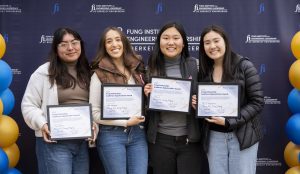
Audience Appreciation Award
This Audience Appreciation Award honors the team whose project is well conceptualized and designed including features that are intentional, based on user feedback and feasible for the organization. This team demonstrated exceptional customer engagement and opportunity for social impact.
Thriving Pink: Journey Mapping
Tess U-Vongcharoen, Sofia Valenzuela, Jenny Lu, Frida Calvo Huerta, Norma Garcia
Team: Nohea Rodriguez [Environmental Economics & Policy + Conservation & Resource Studies], Jenna Braun [Data Science], Amada Tsang [Landscape Architecture], Christina Pham [Business Administration], Anny Moreira [Cognitive Science]
Industry Partner(s): Blue Endeavors – Vince Smith and Shannon Draughon
AquaLearn is an app at the intersection of education and gaming. It incorporates AR/VR components to enhance the scientific learning experience of high school students so that they can better connect with marine life.
Team: Fiona Vogler [Geography, Political Economy], Lisa Zhou [Sustainable Environmental Design], Kira Wiesinger [Molecular & Environmental Biology]
Industry Partner(s): Heartland Rewilding – Kelly Borgmann, Francisco J. Santiago-Avila
Many factors have contributed to the decline of coyote habitats and the increased mortality of coyotes, including creeping urbanization and the stigmatization of coyotes. With urban zones expanding into coyote territory, accurate data collection on coyote-human interaction and educational tools to encourage peaceful coexistence are ever more crucial. In partnership with Heartland Rewinding, this project thus aims to better help Midwestern communities understand patterns and perceptions of urban wildlife to better promote coexistence and non-lethal intervention. This is being done by creating a responsive human-wildlife conflict reporting system and providing corresponding data visualization tools that can be customized by city officials to aid local coexistence efforts.
Team: Dakota Margolis [Conservation & Resource Studies], Natalie Martinez [Society & Environment], Jenny Lee [Genetics & Plant Biology], Sasha Kolesnikov [Media Studies], Salvador Gomez [Society & Environment]
Industry Partner(s): Civic Design Studio – Tommy Wong
We are working with Civic Design Studio to create an outdoor educational space for students at Castlemont High School that emphasizes East Oakland as a space of innovation, connection, and diversity. The project aims to reshape the disparities in minority and low-income communities’ access to green spaces by showing youth that learning from nature can be fostered in any area. It also highlights giving students agency in the spaces that they interact with, bringing attention to the importance of cultural education and reproduction of knowledge that isn’t solely Western or “science”-based. Our deliverable is a booklet with reproducible modules that will make up the education space; these individuals parts can be moved around to give versatility to the space and can be physically created by the Castlemont Fablab in the future. We will also have a model of the space with each of these pieces which focus on methods of urban agriculture, art, education, and more.
Team: Anjana Saravanan [Mechanical Engineering], Aditya Vunuum [Molecular & Cellular Biology], Joelle Siong Sin [Industrial Engineering & Operations Research], Kelsey Leet [Environmental Science], Elena Mujica [Bioengineering]
Industry Partner(s): PMDP – Kevin O’Brien and James Morioka
We aim to design a more efficient cutting and tensioning tool for ghost net removal underwater in the Papahānaumokuākea Marine National Monument. Our proposed tool will make massive net bundles, greater than 1000 lbs at times, easier to remove and safer for divers to maneuver. We also contribute other proposals to assist in addressing the larger issues with net bundle accumulation.
Team: Angel Lee [Public Health & Data Science], Seojin Choi [Landscape Architecture], Sofia Schnurer [Middle Eastern Languages & Cultures], Shreya Aviri [American Cultures], Celine Wang [Integrative Biology]
Industry Partner(s): EFCWest – Sarah Diefendorf and Elaine McCarty
This project is a food sovereignty initiative aimed at improving the health outcomes and self-sufficiency of the Hoopa Valley Tribe, where diabetes and cardiovascular diseases are prevalent due to a lack of access to nutritious food, generational trauma, and numerous other social determinants of health. The project involves designing a cooking curriculum and nutritional science program for local high school students using ingredients from commodity boxes, training instructors from the community in collaboration with partners like Edible Schoolyard Project and 18 Reasons, and addressing social determinants of health that has hindered the community’s access to healthy eating (e.g. lack of transportation to obtain healthy food/ classes). The ultimate goal of this project is to empower the community to take control of their health through healthy, delicious, and easy-to-make meals.
Team: Masoma Naseri [Bioengineering], Catherine Wang [Computer Science, Conservation & Resource Studies], Annesha Ghosh [Engineering Mathematics, Statistics, Computer Science], Kevin Wang [Computer Science]
Industry Partner(s): Shark Stewards – David McGuire
For our solution, we’re developing a web application for shark data collection while integrating both internal and external citizen science components to encourage and incentivize contribution from coastal community members. We’re using iNaturalist’s open-source platform as a foundation for our application to create a database for researchers with a built-in milestone tracker and gamification to encourage citizen contribution. We’re also providing a course on shark conservation to educate and incentivize while searching for potential partners to reach a larger market of citizen contributors.
Team: Matthew Lee [Computer Science & Data Science], Ann-Li Hitosugi [Public Health & Political Economy], Tavleen Bhatia [Data Science & Molecular & Cell Biology], Sofia Abramsky-Sze [Public Health & Psychology]
Industry Partner(s): BeMe – Neha Chaudhary
How might we improve the BeMe app’s self-guided activities to be more inclusive of a wider range of backgrounds and to encourage the practicing of self-led coping and resilience skills? With this question in mind, we aimed to adapt the BeMe app, which focuses on teen mental health. We are looking to improve anxiety and depression as well as increase hope, coping skills, self-awareness, self-esteem, self efficacy, social connectedness / sense of belonging. Thus far, we have conducted several user interviews and created over 75 ideas for self-care activities to integrate into the app.
Team: Manasi Kumar [Bioengineering], Alexa Aguilar [Public Health], Shreya, Ramesh [Bioengineering & Business]
Industry Partner(s): UHS Exercise
Currently, many students struggle with finding the time and resources to exercise due to busy schedules or a lack of resources and understanding of how to use currently available resources. However, numerous studies have shown that there are numerous heath and well-being benefits associated with increased exercise. Our project seeks to find and design an app to allow students to find ways to exercise that can easily be incorporated into their lifestyle.
Team: Haley Mendlin [Business Administration], Yessenia Reynoso [Interdisciplinary Studies], Vishwaa Sofat [Political Science & Interdisciplinary Studies], Rohan, Shinkre [Bioengineering]
Industry Partner(s): Kaiser Permanente – Deanna M Konrath
Our project aims to support caregivers for the elderly through an interactive app that gives caregivers a centralized location to track their caregiving journey. The app includes a social messaging portal that can give them access to other people going through the same struggles and a “learn” page that provides personalized educational material about their patients’ issues. We also incorporated a myFuture tab for both patients and caregivers to make aging less scary for patients—this will facilitate the conversation to plan people’s aging journey and inform caregivers of their patients’ desires.
Team: Victor Le [Integrative Human Biology], Madeeha Khan [Data Science], Lauren Clawson [Public Health], Liv Rainville [Cognitive Science]
Industry Partner(s): UCSF Digital Health & Kidney Transplant Team – Hannah Lim
In a world where the demand for kidney donations disproportionately outweighs the supply, UCSF has introduced a novel program called the Kidney Transplant Prelist which offers resources and support to patients who do not yet qualify to be on the transplant waitlist. Outstanding unmet health goals, the challenge of matching with a living donor, and prolonged dialysis treatment can overburden and isolate a patient. RenalReach is a comprehensive digital interface that offers patients a clear and personalized goal tracker to help them understand the steps they need to take in their health journey to take in order to be considered for a full evaluation for transplant.
Team: Nicole Liu [Public Health & Psychology & Cognitive Science], Lida Kaphar [Molecular & Cellular Biology], Claire Sawyer [Science & Technology & Society], Dhruv Vaish [EECS & Bioengineering]
Industry Partner(s): Sportzpeak – Dr. Anthony Luke
Our goal this semester was to create a simpler workflow for athletes using the Sportzpeak app to be able to get help quickly. Sportzpeak is a mobile application for referring patient’s to specialized providers quickly and easily. This semester, we have done extensive market research and user interviews to understand where in the process there may be difficulties, whether on the athlete or the provider side, and how we can design to solve them. Our final product is an attempt at making the workflow for emergency technicians more efficient and effective on the ground and demonstrating in software how to realize these cleaner designs.
Team: Tess U-Vongcharoen [Data Science], Sofia Valenzuela [Public Health], Jenny Lu [Integrative Biology], Frida Calvo Huerta [Interdisciplinary Studies], Norma Garcia [Business Administration]
Industry Partner(s): Thriving Pink – Joni Rubin & Gayle Barry
This semester, our group has partnered with Thriving Pink in order to learn more about how members of the Yolo county community find and use resources through their breast cancer journey. We have used our findings from interviews and observations to create journey maps and user personas to inform the Thriving Pink leadership team on gaps in the current services and outreach to better connect with thrivers in Yolo County. Through 15 interviews, 2 grant ceremonies, and meetings with our client, we have gained a deeper understanding of the breast cancer community in Yolo county and will propose recommendations to strengthen their new outreach program, prospeROSA – an initiative dedicated to Spanish speaking communities.
Team: Laura Lira [Industrial Engineering and Operations Research], Chang Bo [Mechanical Engineering]
Industry Partner(s): Blue Endeavors – Vince Smith, Shark Stewards – David McGuire
Blue Endeavors and Shark Stewards have identified the need to advance data collection tools for oceanic manta rays – the first manta ray species to be re-listed as Endangered by the IUCN – and other marine megafauna. This project explores the research and design of an underwater tablet housing that will allow researchers, community scientists, and conservationists to document visual and written observations during scuba diving encounters. Innovating new research tool approaches for historically “data-deficient” marine megafauna species will be a crucial step in creating protected ocean areas and preserving marine biodiversity.
Team: Sharicka Zutshi [Bioengineering], Emma Stephan [Bioengineering & EECS], Holly Pilling [Psychology]
Industry Partner(s): CITRIS Invention Lab – Chris Myers
Our team has worked for the past 1.5 years on developing a neural-integrated soft exoskeleton glove for people with hand paralysis. The purpose of the glove is to help the over 200,000 people with hand paralysis in the United States alone with hand rehabilitation. The glove will help reduce muscle contractures and atrophy that can limit motion, function, self care, and possibilities for future muscle and nerve treatments for paralysis patients.
Team: Megane Tchatchouang [Data Science], Sana Desai [Integrative Biology], Saroj Khanolkar [Nutritional Sciences], Zaynab At-Taras [Data Science], Tasmiah Khan [Public Health]
Industry Partner(s): N/A
There is a recurring disconnect between the challenges Multiple Sclerosis symptoms imposed the daily lives of patients, and the difficulty of obtaining acommodations and understanding for this ‘invisible disease.’ Our advocacy application that aims to bridge the gap between the debilitating symptoms of MS and the ins-and-outs of everyday life (career, school, family, and more). The application demystifies the process of getting accommodations and allow others (and yourself) to better understand the needs of MS patients.
Team: Niko Bardin [Business], Priyanka Venkatesh [Environmental Science], Char Potes [Rhetoric]
Industry Partner(s): Plastic Pollution Coalition – Amelia Hanson
Our project focuses on the idea of the red solo cup and looking into definitions of sustainability. This is with the end goal of outlining audience profiles for PPC’s Flip the Script campaign on Instagram, which seeks to raise awareness of single use plastics in media.
We cannot guarantee that all guests attending the event have been vaccinated. Please review current UC Berkeley COVID-19 policies and resources. This information may be updated at any time and changes to local and state health regulations may alter event plans.
If you require an accommodation for effective communication (ASL interpreting/CART captioning, alternative media formats, etc.), please reach out to Jené Madison at jmadison@berkeley.edu by Friday, April 28.





